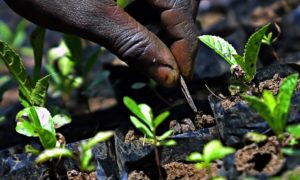Between 2000 and 2010, a total of 500 million acres of land in Asia, Africa, Latin America and the Caribbean was acquired or negotiated under deals brokered on behalf of foreign governments or transnational corporations.
Many such deals are geared toward growing crops or biofuels for export to richer, developed countries – with the consequence that small-holder farmers are displaced from their land and lose their livelihood while local communities go hungry.
The concentration of ownership of the world’s farmland in the hands of powerful investors and corporations is rapidly accelerating, driven by resource scarcity and, thus, rising prices
According to a new report by the U.S. land rights organization, Grain: “The powerful demands of food and energy industries are shifting farmland and water away from direct local food production to the production of commodities for industrial processing.”
Less-known factors, however, include conservation and carbon offsetting.
U.K.-based NGO Forest Peoples Program reported that in west Kenya over a thousand homes had been torched by the government’s Kenya Forest Service to forcibly evict the 15,000 strong Sengwer indigenous people from their ancestral homes in the Embobut Forest and the Cherangani Hills.
Since 2007, successive Kenyan governments have threatened Sengwer communities in the Embobut Forest with eviction. A deadline for residents to leave the forest expired in early January, prompting the most recent spate of violence. The pretext for the eviction is that the indigenous Sengwer – labelled wrongly as ‘squatters’ – are responsible for the accelerating degradation of the forest.
Elsewhere in Kenya’s Mount Elgon forest, however, the KFS’ track record reveals a more complicated story
. In 2010, the indigenous Ogiek were issued a deadline to relocate in the name of forest conservation and reforestation. In February this year, Survival International reported that, like the Sengwer, the Ogiek continued to be violently evicted from their homes in violation of court orders, with reports of government officials and their supporters seizing their land.
While deforestation is undoubtedly linked to the activities of poor communities, the Kenyan government’s approach illustrates favoritism toward parochial vested interests. In addition to the indigenous communities, the forests are also inhabited by many thousands of tea-planters, loggers, and squatters.
According to an internal report by the International Union for Conservation of Nature in 2000, reviewing the Kenyan government’s internationally-funded conservation program, “The forests of Mt Elgon are not being sustainably managed.”
The report highlighted “unsustainable harvesting of both indigenous and plantation forest on Mt Elgon,” routine flouting of “regulations and procedures for sound management,” “the rate of forest plantation harvesting” far exceeding “the rate of replanting,” lack of supervision of controls on “forest harvesting operations authorized by the Forest Department,” and consequently, “extensive loss of forest resources.”
The IUCN review also alluded to the role of the Kenyan government’s relationship with RaiPly Ltd, a Kenyan company involved in manufacture of wood products: “It is not known why or how RaiPly presumably received a license to harvest indigenous species, thus circumventing the ban on harvesting in indigenous forests,” it said.
Read more at theguardian.com.



